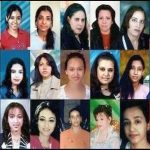Coptic Solidarity Urges US State Department to Follow USCIR’s Lead & Recommendations.
The US Department of State released its Report on International Religious Freedom to Congress on May 15, 2023. This annual report examines the state of religious freedom in every country except the US, in accordance with the 1998 International Religious Freedom Act. Each year, Coptic Solidarity (CS) provides an analysis of the Egypt chapter including our areas of agreement, constructive criticism, and recommendations for future reports. Analyses from previous years can be found at the end of this analysis.
Coptic Solidarity’s overall evaluation of the report is that the 2022 report is similar to previous reports in tone and content, but is considerably longer, including numerous specific examples which illustrate the situation. The inclusion of numerous examples of religious freedom violations can be useful, but without utilizing that data to draw conclusions, the benefit is curtailed.
In comparison, and despite having far fewer staff and resources, the US Commission on International Religious Freedom’s (USCIRF) latest annual report on Egypt, and particularly the longer updated report that USCIRF just published in August 2023, provided more insightful analysis.
Indeed, as CS published in our analysis of the State Department’s report last year:
“CS notes with deep concern that the Egyptian government’s relentless PR efforts appear to have succeed in unduly improving the country’s image despite the lack of real progress on the ground. This has resulted in years of reporting with virtually no improvement in the daily life of Egypt’s indigenous Copts and other religious minorities.
There are countless ways President El-Sisi could demonstrate a commitment to improving religious freedom such as removal of religion from ID cards, ending the use of blasphemy laws, ensuring all religious minorities can practice, build houses of worship, and import religious literature, include religious minorities in the cabinet, in appointments of deans of universities, governors, judges, national security positions, and insisting that minorities be allowed to compete in sports and represent Egypt internationally. For these annual reports and the policy recommendations to be effective, the State Department should place greater focus on the systemic forms of discrimination and obstacles to the enjoyment of freedom of religion or belief for all Egyptians.”
The USCIRF appears to have arrived at a similar conclusion that Egypt has shown positive cosmetic gestures but is capable of doing much more to end the systematic discrimination against Copts and all religious minorities. USCIRF states:
“The report concludes that Egypt, as a country that has demonstrated an interest in making improvements, is well-positioned to go beyond symbolic gestures promoting “religious tolerance” and make systemic changes to its laws and criminal justice system that significantly advance religious freedom for all Egyptians.”
Positives:
- Reported on the 2% glass ceiling Copts face in the judiciary, military and police and diplomatic corps including the few notable appointments, and the continued underrepresentation or complete absence in other government positions.
- Included reporting on the abduction and forced conversion of Coptic women and girls.
- The report states the total number of churches and service buildings that have applied for legal status since 2017 (3,730) and that the total number granted by year end being 2, 526, unlike the 2021 report which did not include the full number of applications.
- Includes follow-up on the displaced Copts from Arish in 2017, that they are finally being assigned government jobs.
- Includes information on discrimination against Coptic footballers and a Coptic referee. Only two Copts play in the Egyptian Premier League, which is important for FIFA and the International Olympic Committee to know and encourage their action.
- Section on Societal Status of Religious Freedom includes many important issues demonstrating the difficulties for religious minorities in daily life. The inclusion of Khaled Montasser’s critique of Egypt’s educational system and how it is cultivating individuals ripe for recruitment to terrorist organizations is particularly poignant.
Constructive Criticism:
- The report contains the same sentence about Al-Azhar having a separate school system that serves about 2 million students, but still has not elaborated on government funding for this institution that discriminates against non-Muslims and undermines the very principle of unified national education to all citizens, nor discusses the curriculum that denigrates members of non-Muslim faiths.
- The report still fails to explain that nearly all the church registrations granted are merely preliminary approvals, and that churches still must complete expensive and onerous conditions to receive final approvals.
- The report presents information at times with greater context such as the use of reconciliation sessions explaining how they are used and how they often rob Copts of justice and restitution. Yet, in other areas, information is presented without a countering perspective which could easily mislead the audience, such as a US legislator, staff member, or immigration officer regarding the situation of religious freedom in Egypt. For example, after citing the number of church approvals (that already lacks sufficient context) the report states, “While some non-Coptic-Orthodox groups said the approval process took longer than normal, Coptic leaders said they were satisfied with the pace of committee approvals…”Later, the report proceeds to include information on the number of Sunni mosques “constructed, developed, or maintained” since El-Sisi came to power in 2014 as 8,500 and that the Ministry of Awqaf has spent about $363.7 million to renovate about 9,000 mosque in that timeframe and built 260 mosques in the last year alone. But the reader is to believe Copts are content with the persistent situation of lack of sufficient number of churches (especially in the countryside), inability to repair existing churches, and loss of churches due to numerous church fires and closure of churches due to mob violence. The report’s concluding section does state that the U.S. Government raised these issues of church permits, repairs, and fires with the Egyptian government at multiple levels.
Recommendations:
- Add Egypt to the Special Watch List as recommended by USCIRF
- Update size of the Coptic population in Egypt utilizing the new statistics provided by HH Pope Tawadros in 2023 demonstrating that they represent an estimated 14% of the Egyptian population which is about 15 million people.
- CS encourages the USG to urge Egypt to limit the use and existence of religiously based personal status laws which translates to inequality under the law. Laws created, adjudicated, and enforced by religious leaders create a dangerous environment in which religious leaders have authority in civil space without proper accountability or recourse for those governed by their decision. The result is that women and children often suffer in circumstances of domestic violence, sexual, emotional, and verbal abuse, and have no legal option or support, should they try to escape. To be kept in mind is that the community personal status laws (for non-Muslims) that were in effect until 1956 have been over-ridden by Shari’a, such as in the case of Baby Shenouda (adoption). Egypt ultimately needs a truly civic (non-religious) personal status governance that applies equally to all citizens. If a uniform (secular) personal status law for all Egyptians were to be difficult to have in the immediate future, then encourage Egypt to adopt laws for non-Muslims that are in line with their respective canons and the needs specified by community councils.
- CS encourages further investigation of abducted/lured Coptic women, particularly the claim that government officials assist in locating the missing women. Interviewing family members of those abducted, recovered women, and discovering if any services are made available to them would be helpful. Numerous families report these abductions to CS and claim that local police and government officials are often the major impediment to locating and recovering the women by refusing to accept missing persons reports, refusing to follow-up on leads, and failing to prosecute those invovled.
- The Egyptian government told USG officials that representatives of Christian denominations will be invited to a meeting to discuss how they could conform to the codes and safety measures, presumably in response to the issue of most church legalization being conditional. The next report should follow up and find out if and who was invited to these meetings, and the result. How many churches moved from preliminary approval to final approval, or are they all tied-up in a bureaucracy with not real intent to provide final approvals?
- Advocate for and report on the case of Soad Thabet, one of the most flagrant violations of religious freedom and miscarriage of justice against a religious minority that remains unresolved in Egypt.
Coptic Solidarity Analyses from Previous Years
- 2021 – Coptic Solidarity Analysis of State Department’s 2021 IRF Report: Hidden Realities of Religious Discrimination in Egypt
- 2020 – Annual State Department Report 2020: What Constitutes Improvement for Copts in Egypt?
- 2019 – Annual State Department Report 2019 Confirm Systematic Discrimination Against Religious Minorities in Egypt
- 2018 – An Assessment by Coptic Solidarity: State Department 2018 Annual International Religious Freedom Report on Egypt
- 2017 – Coptic Solidarity Analysis and Recommendations on 2017 Egypt Chapter of State Department Report
- 2016 – Coptic Solidarity Applauds 2016 Egypt Chapter of State Department International Religious Freedom Report and Provides Recommendations
- 2015 – State Department’s 2015 Annual IRF Report Claims Improved Status of Copts as Key Positive Development in State of Religious Freedom Worldwide
- 2014 – Analysis of Egypt Portion of the 2014 IRF Report
Photo Credit: US Department of State





